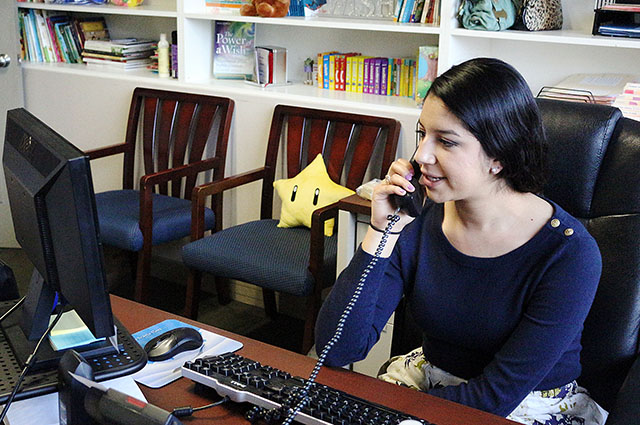Texas Nonprofits Hunting for More Spanish-Speaking Volunteers

Danielle Ceron is one of two recently hired bilingual coordinators for the Make-A-Wish Foundation of Central Texas. Several organizations in the area are seeking Spanish-speaking volunteers. Photo by Esmeralda Coronado.
By Esmeralda Coronado
For Reporting Texas
Big Brothers and Big Sisters of Central and South Texas is raising money for a television ad campaign this fall. The goal: recruiting more Spanish-speaking volunteers for a nonprofit that is having a hard time finding enough bilingual volunteers in an area with a growing Hispanic population.
Forty percent of the children the nonprofit serves are Hispanic, said Veronica Fox, the organization’s communications director. The children are bilingual, but their parents speak only Spanish, and the nonprofit needs to communicate with them as well, she said.
Six hundred children are on the waiting list for mentors, most of them boys who need Spanish-speaking mentors, Fox said. Some wait longer than the typical three to six months to get a mentor. The nonprofit matches adult mentors with children who need a positive, supportive relationship in their lives.
“Two of our biggest needs that never change are male mentors and bilingual Spanish-speaking mentors,” she said. “They don’t have to be Hispanic. Bilingual, period, is an ongoing need.”
Other Austin area nonprofits face the same problem. Family Eldercare and Caritas of Austin, among others, also need more Spanish-speaking volunteers, according to postings on volunteermatch.org, which helps nonprofits in Austin and other cities find volunteers. The Austin Humane Society wants Spanish-speaking greeters for its pet-adoption department.
The need is growing as the region’s Hispanic population expands at a rapid rate. Thirty-five percent of Austin residents are Hispanic, up from 31 percent in 2000, according to the city’s website. Latinos were 29 percent of Round Rock’s population in the 2010 Census, up from 22 percent in 2000. Twenty-two percent of people older than 5 in the Austin-San Marcos area speak Spanish at home, according to the U.S. Census Bureau.
Older Hispanics are more likely to be solely or mostly Spanish-speaking, while proficiency declines among younger people, according to the Pew Hispanic Center.
The Make-A-Wish Foundation also is in desperate need of Spanish-speaking volunteers. The nonprofit grants wishes, such as trips or meetings with celebrities, to children with life-threatening medical conditions. The Austin chapter serves 230 children a year. According to Charity Embry, the foundation’s operations and volunteer manager, a good portion of the clients come from families where the parents speak limited or no English.
Spanish-speaking volunteers are needed to translate for children from non-English-speaking families so the foundation can understand what the children want.
The foundation has about 300 active volunteers who serve an area from Temple to Laredo, including Central Texas. In the Austin area, there are 25 to 30 Spanish-speakers, Embry said.
Embry said the lack of Spanish-speaking volunteers has always been a problem for the foundation and attributes it to the growing Austin population and the huge influx of Latinos. The nonprofit has put notices in publications and partnered with the Hispanic Chamber of Commerce. She said she doesn’t know whether people are not seeing the notices or are simply not responding.
Margie Norton, 59, who lives in Laredo, has volunteered with the organization for 15 years. Originally from Houston, she learned Spanish to assist in her work as a pediatric nurse.
Laredo volunteers through Make-A-Wish offices in Austin and San Antonio.
“So many times, they have to call me or other volunteers to translate. They can’t directly deal with families,” she said.
Within the past year, the foundation has hired two full-time bilingual wish-granting coordinators, Danielle Ceron, a 21-year-old University of Texas graduate, and Jessica Rivera, 28.
Embry said the coordinators have made it easier to grant the children’s wishes in a reasonable time.
“Having those wish-granting coordinators has been amazing,” Norton said. “It takes a lot of pressure off being the middleman between the office and families.”
Fox said Big Brothers and Big Sisters has reached out to professional groups and cultural centers looking for Spanish-speaking mentors.
“It’s not an easy identification,” she said. “We can’t know if someone is bilingual. It’s intangible, and that is why it takes longer.”
Sergio Romero, a professor in the Spanish and Portuguese Department at the University of Texas at Austin, said he wished nonprofits would pay for Spanish-speaking translators, instead of relying on volunteers to address the need.
And he said volunteers may need more than language skills, depending on what country the people they’re trying to help come from.
“You might be able to communicate in certain domains, terms, areas, but not in others,” he said. “In situations of translation, there might be someone there to speak the language, but that doesn’t mean your clients actually understand or share with you the cultural knowledge necessary for them to actually grasp what you are talking about.”